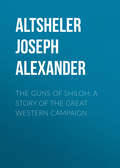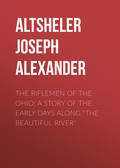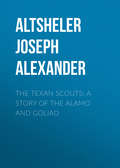
Altsheler Joseph Alexander
The Hosts of the Air
When they were yet two hundred yards away, Picard stepped into the middle of the road and called to them in a loud voice to halt. He saw von Boehlen throw up his head, say something to his troop, and then try to urge his horse to a faster gait.
Picard sighed. He knew that von Boehlen was a brave man and he respected brave men. A disagreeable task lay before him, one that must be done, but he would give him another chance. He called again and louder than before for them to halt, but von Boehlen came on steadily. Then Picard promptly raised his rifle and shot him through the heart.
When von Boehlen fell dead in the road his hussars halted and while they were hesitating Picard shot the horses of two under them, while a third received a bullet in the shoulder. Then all of them fled on horse or on foot into the valley while Picard went calmly back to the fire which was now sending its signal across the whole heavens. He told John in a whisper of what had befallen, and soon he returned to his place in the road to watch.
John and Julie by and by left Suzanne to feed the fire and they stood hand in hand gazing now at the heavens and now at the dark pine forests. The velvet blue of the sky faded into the dark hour and then the dawn came, edged with silver, turning to pink and then to gold, like a robe of many colors, drawn slowly out of the infinite. Suzanne suddenly uttered a great cry.
"Look up! Look up, my children!" she cried.
Coming out of the west which was yet in dusk was a black dot and then three others—behind it in Indian file.
"We're saved," cried Suzanne. "It's Monsieur Philip and his friends'"
"How do you know? You can't see yet," said John, almost afraid to hope.
"I don't need to see it! I feel it, and I know!" replied Suzanne. "Look, how they come!"
John trembled and the hand of Julie in his own trembled too, but it was not fear, it was the feeling that a miracle, a miracle to save them, was coming to pass.
The four black dots moved on out of the west and John knew that they were aeroplanes coming swiftly and directly toward their mountain. The dawn reaching the zenith spread also to the west and the flying machines were outlined clearly in the luminous golden haze. Then John, too, uttered a great cry.
He knew the slender sinuous shape that led. As far as eye could reach he would recognize the Arrow. The miracle was done. They had called to Philip in their desperate need and he had come.
"Philip and the Arrow!" he exclaimed. "We're saved!"
"I knew that he would come!" Julie said, as she stared wide-eyed into the blue and gold of the heavens.
Now the aeroplanes flew at almost incredible speed, the Arrow always at their head, poised for a few moments directly over their heads, and then came down in a dazzling series of spirals, landing almost at their feet.
"Philip, my brother!" exclaimed Julie, as the slender compact figure that they knew so well stepped gracefully from the Arrow.
He took off his heavy glasses and gazed at them as they stood, forgetting that they were still hand in hand. Then he smiled and lifting his cap in his old dramatic way he said:
"It seems that for several reasons I didn't come too soon."
"No," replied John, calmly, and holding firmly the little hand in his, "you have arrived just in time to give your consent to my marriage with your sister."
"And what does Mademoiselle Julie Lannes say?"
The rising sun clothed Julie in a shower of gold. Never before had the wonderful golden hair seemed more wonderful. Never before had she seemed to the youthful eyes of her lover more nearly divine.
"Julie Lannes says," she replied bravely, "that if John Scott wishes her to be his wife and her mother and brother consent she will gladly marry him."
"Then we must hurry away, or it will be a wedding; without either a bride or a bridegroom. Are not those Austrian hussars at the bottom of the slope, Picard?"
"Yes, monsieur."
"Then it's up and away with us. Here are Caumartin, Méry and Castelneau, old friends of yours, John, but it was Delaunois who brought me the last news of you. Caumartin has the Omnibus, and in it the bridal pair must travel. I can't take you with me in the Arrow now, John, as it admits of only a single passenger. But do you, Picard, take the rifles and come with me. We'll cover the rear of our flight. Now, hasten! Hasten!"
John and Julie in an instant were side by side in the Omnibus, Picard, forgetting all fear of aeroplanes, was with Philip, and the four machines rose, circling above the mountain, Caumartin's big plane leading. John and Julie sat very close together and her hand was again in his.
"Fear not, dearest," he said. "When all seemed lost Philip came for us."
"But you came for me first and you risked your life many times. To give myself to you seems but a small reward for all that you've done."
"It's a reward that kings and princes in their power cannot win."
Then they fell silent, their emotion too deep for speech. Philip had spoken in jest, but it was almost like a wedding trip. The hussars below had reached the abandoned automobile, and fired vain shots at the disappearing aeroplanes, but John and Julie heeded them not. War and brute passions were left behind, and they were sailing through the calm blue ether.
Caumartin, the stalwart, was wholly absorbed in steering his great machine and they sat behind him, very close together, still hand in hand, watching the great panorama of the heavens, unrolled before them. It was the most beautiful sky that they had ever seen, dyed that day into intensely vivid colors by the master hand. Far away were great pink terraces of color, changing to blue or gold or silver, while below them revolved the earth, clad in deepest green, save where far peaks were crested with snow.
Both John and Julie breathed an infinite peace. The war sank farther and farther away, as they sailed on through peaceful heavens, surcharged with infinite color. Both felt, with the certainty of truth, that their troubles and dangers were over, and they now left the journey and its needs to Philip and his able comrades.
"After we're married, Julie, you'll go to America with me for awhile," said John, "but we'll come back to France. We shall divide our time between two homes, your country and mine, now the countries of both."
The hand within his own returned his pressure. Caumartin turned his machine toward the north, avoiding neutral Switzerland, and sailing at great speed they passed beyond the German lines and over the fair land of France that all of them loved so well.
Caumartin kept his place in front. Suzanne was in the machine just behind and Philip and Picard in the Arrow always hovered in the rear. That night they descended within the French lines, and John heard the next day that Prince Karl of Auersperg had been killed in battle. It was singular, perhaps, but John felt a touch of pity for him. He had wanted something very greatly and, powerful prince though he was, his power had not been great enough to win it for him.
They were married in Notre Dame by the Archbishop of Paris. The influence of John's uncle, the senator and great mining millionaire, was sufficient to procure John's release from the army. In truth, General Vaugirard, although he was fat and sixty, had a strong vein of sentiment, and he was one of the most distinguished guests in Notre Dame, where he puffed mightily and kept himself with great difficulty from whistling his approval. He and Senator Pomeroy stood together and he nodded emphatically when the senator told him, with a certain pride in his whisper, that while John, his sole heir, was not a prince, he could buy and sell many who were.
General Vaugirard was not the only distinguished officer at the marriage. There was a lull in the operations and all of John's friends came to Paris to see him wed the beautiful Julie Lannes. A little man, with the brow of a Napoleon, the famous general, Bougainville, whose rise had been so astonishing, stood beside General Vaugirard.
Daniel Colton, now a colonel, his arm in a sling, was not far away. Carstairs was there, a bandage about his head, and Wharton was with him, his shoulder yet sore from the path that a bullet had made through it. It was decreed that while these friends of John's should receive many wounds, all of them were to survive the great war.
They were to spend three days at the little house beyond the Seine before sailing, and as the twilight came on they sat together and looked out over the City of Light, melting into the dusk after a golden day. The subdued hum of Paris came to them in a note of infinite sweetness and peace.
John was stirred to the depths, but his emotion, like that of most deep natures, was quiet. He felt Julie's hand tremble a little in his own, as the voice of Paris grew fainter but sweeter. The twilight faded into the night and the buildings grew misty.
"We have passed through many dangers, Julie," said John, "but for me at least the reward is greater than them all. When did you begin to love me?"
"You were my gallant knight from the first, but, if it had not been so, how could I have kept from loving the fearless crusader who dared all and who risked his life every day in the country of the enemy to save me?"
"I'd have been a poor and worthless creature if I hadn't done so, Julie."
"Few men have done so, though, even for love."
Stirred by an emotion deeper than ever, and wholly pure, he put his arms around her, and their lips met in a long kiss of young love.
The first dusk thinned away, the sky turned to a vault of burnished silver, and, the infinite stars coming out, danced their approval.





